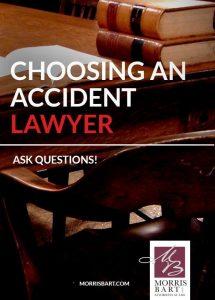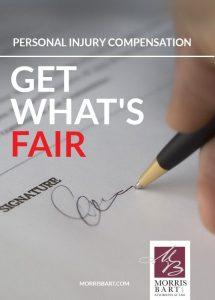
If you or a loved one suffered injuries in a negligence accident in Birmingham or a nearby area, a lawyer from our personal injury law firm may be able to help you recover compensation. We may be able to pursue damages for you that include money for related medical bills, missed paychecks, property damages, future expenses and losses, pain and suffering, and more.
In some cases, the best way to get justice is to sue the at-fault party and take the case to trial in the local civil court. This is usually through Jefferson County court for incidents that occurred in Birmingham. Our attorneys build strong cases to show how our clients suffered preventable injuries due to someone else’s negligence and have a right to recover compensation.
Do You Have to Sue to Get the Money Damages You Need and Deserve?
Most victims of personal injuries never go to trial with their case. Their legal options for recovering damages offer other options, and they opt to try a less expensive and time-consuming approach—an insurance claim. In many cases, the two options available to victims include:
- Filing a claim based on the at-fault party’s liability insurance coverage
- Filing a civil lawsuit and taking the case to trial
Most settle outside of court, often without ever suing the liable party or parties. The insurance companies generally want to avoid court, too. This is especially true when they know there is a strong case and evidence available to show their policyholder acted negligently. They will likely have to pay out either way. They can maintain more control over how much and the speed of the case if they keep it out of court.
Of course, there are some situations when our attorneys recommend a lawsuit for our clients. It may be necessary to recover fair compensation in some cases. This could include:
- When the insurer will not negotiate and offer a fair settlement
- When there are questions about fault and liability
- When the insurer claims our client contributed to their injuries
- When the insurer refuses to accept the severity of our client’s injuries
- When the liable party does not have insurance coverage
- When the deadline is near for suing
In some cases, our attorneys know right away during the initial consultation that a case will likely require a lawsuit. In others, the situation may change, or other factors may arise that point us toward that recommendation as the case moves forward.
As always, the decision to sue is up to the client. However, we will offer advice and guidance, as well as answer the questions you have about the process, to help you make the right decision for you and your family.
For a free legal consultation, call 800-537-8185
How Long Do You Have to File a Personal Injury Lawsuit in Birmingham?
There is a two-year statute of limitations that applies to most personal injury lawsuits in Birmingham, per Ala. Code § 6-2-38. While there are exceptions, many give victims even less time to take legal action. Generally, if you do not sue by the second anniversary of your injuries or your loved one’s death, the court will bar you from moving forward with your legal action.
In other words, missing the deadline to sue will make it almost impossible to recover a fair and just payout despite the strength of your case or evidence of your damages. It is essential to beat this deadline if you hope to secure a financial recovery.
While your attorney may advise you to sue the liable party because the deadline is close, filing a civil complaint (lawsuit) does not mean your case will go to trial. Most will still reach an acceptable settlement prior to going before the jury. In most situations, a civil suit will not stop the negotiations. In fact, the insurer may increase their offer because they see you are serious about taking them to court.
Understanding the Civil Court Case and Process
Many people are anxious about taking their case to court because they do not know what to expect or what to do. Having a knowledgeable trial attorney on your side should help because they will have been here many times before. They can offer advice on everything from how to answer questions during discovery to where to park at the local courthouse. You are not going through this alone.
Understanding the steps of a civil lawsuit can also help put you at ease. Each step can take weeks or even months. The timelines vary widely. But knowing what is coming next is important. The steps of a civil lawsuit in Alabama include:
Preparing and Filing the Complaint
Once an accident victim decides to sue, their attorney will prepare a complaint and file it with the appropriate civil court. They will also ensure the at-fault party—the defendant in the lawsuit—is served a copy according to the applicable rules in that jurisdiction.
This complaint essentially outlines the case against the defendant and what relief they hope to get from the court because of the harm they incurred. It will include details about their injuries and damages, the accident, the accused party’s negligence, and other important facts of the case.
Serving the Defendant and Receiving a Response
When a defendant and their attorney receive a complaint and learn of the pending lawsuit, they can either answer with their own “response” or counter-sue and accuse the plaintiff of causing the accident and their injuries. Which of these occurs will depend greatly on the facts of the case and if they dispute the details of the incident.
The accused party will have a limited time to respond but may receive an extension under some circumstances. This could take a month or longer.
Discovery of Evidence
Discovery is the step where each side begins to build its case. They want to gather as much evidence as possible to prove their allegations and get a verdict in their favor from the judge or jury. This is often the longest and most involved step in the personal injury lawsuit process.
The law firms representing each side will investigate what happened and obtain evidence, including:
- Physical evidence
- Eyewitness statements
- Videos and photos
- Any official reports related to the incident
- Relevant medical records
- Interrogatories, where everyone involved answers questions
- Depositions from experts and other possible witnesses
Each side can also ask the other to share their evidence, the names of their witnesses, and other information. Discovery allows both sides to support their claims with evidence and documentation, developing the strongest possible argument to present to the judge or jury during trial.
What one side finds during discovery may be surprising, or they may realize their case is not as strong as they suspected it might be. This can lead to settlement offers or dropping the case, depending on if the plaintiff or defendant decides to act.
Settlement Talks May Continue
Throughout every step of the lawsuit process, and sometimes right up until the moment the trial begins, settlement talks may continue. Filing a lawsuit does not stop the insurer or the liable party and their representatives from trying to reach an agreement with the victim if they are inclined to do so. Taking legal action or the evidence uncovered during discovery may increase their offer, in fact.
Some courts require the parties to try to reach an agreement before going to trial. This is commonly done with the help of a mediator who can discuss the possible outcome of the court trial and help the parties reach a fair middle ground. Mediation, even when not required, is often helpful and may lead to an out-of-court settlement. This allows both parties to avoid the stress and expense of a trial.
In some insurance contracts and other agreements the victim may have signed, arbitration is required. This is similar to mediation, except the arbitrator has the authority to decide in the case and order one party to pay.
The Case Goes to Trial
Civil trials may last for an hour, an afternoon, or several days. Most will not be the all-consuming, weeks-long criminal trials you see on television or in the movies. There are several parts to a trial that your attorney will lead you through and represent your best interests during. This includes:
- Filing of Briefs: Both parties will submit a brief that outlines their argument, the evidence, and the witnesses.
- Opening Statements: This generally begins with the plaintiff (the victim). Their attorney will describe their allegations and what they plan to prove during the trial. Then, the attorney representing the at-fault party (the defendant) will have the same opportunity.
- Presentation of Evidence: Each party will present the evidence to the judge or jury to try to prove their case. They may also call witnesses to the stand for testimony. The other party will have an opportunity to question these witnesses, as well.
- Closing Statements: After each side presents their evidence, the attorneys will take turns making closing statements. These often address the judge or jury directly. They sum up the case and ask them to rule in their favor.
Verdict and Orders
After closing statements, the judge or jury—depending on the type of trial you had—will take some time to deliberate. They will review the facts of the case and determine if they believe the allegations you presented, the evidence used to show negligence and liability, and the proof of damages. They may call you back into the courtroom in a few minutes, but often it takes days or weeks before you learn the outcome of your trial.
There are two verdicts that occur in these cases: In favor of the plaintiff (the victim) or the defendant (the accused party). If they rule in favor of the defendant, they are unlikely to award you any damages. However, when a judge or jury rules in your favor, they will likely also issue orders for the defendant to pay you compensation, sometimes known as a “court award.”
The court awards the plaintiff money based on the evidence of their damages and other factors presented at trial. This will likely center on compensatory damages for your economic or non-economic losses in a personal injury case and punitive damages in a Birmingham wrongful death case. Your attorney may be able to give you a general idea of what to expect based on their experience, but only the judge or jury will know for sure.
Click to contact our personal injury lawyers today
The Role of the Attorney in a Birmingham Personal Injury Lawsuit
Not only will your attorney help you determine the best option to pursue compensation based on the circumstances of your injuries, but they will also handle the entire process on your behalf. You can count on them to fight for your fair compensation and best interests in insurance negotiations, during the legal process, and at trial.
At the Morris Bart law office in Birmingham, our team can help those injured in a wide variety of negligence incidents, including:
- Car accidents
- Truck accidents
- DUI crashes
- Slip and fall
- Medical malpractice
- Jones Act injuries
- Dangerous drugs
- Defective products
Like many personal injury firms in Alabama, we represent our clients based on a contingency fee. This is an agreed-upon percentage of your compensation to cover our attorney’s fees. We do not charge our clients until the case is over, and they never pay an attorney’s fee unless we win damages in their case.
Discuss Your Birmingham Personal Injury Case With Us for Free
You can speak with an attorney from the Morris Bart law firm about your case today for free. Our lawyers can assess your options based on the facts of your case and help you decide what to do next. We are here to help you understand your insurance claim or lawsuit and to navigate the process for you. Call to speak with a lawyer to get started with your free consultation.
Questions?Call 800-537-8185
to find a Morris Bart office near you.





